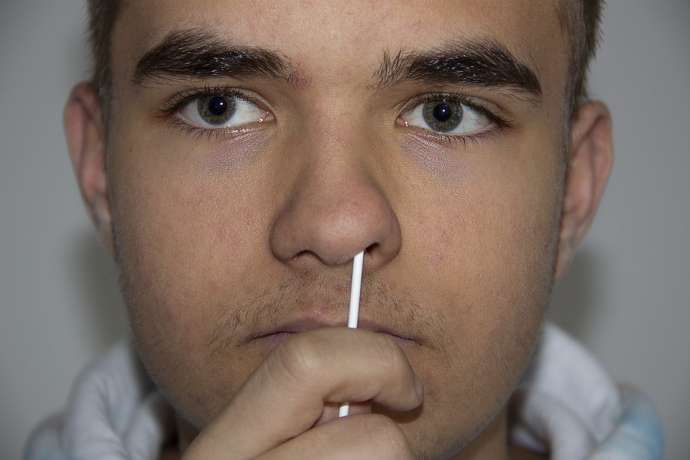STA, 13 April 2021 - Voluntary self-testing of secondary school pupils for coronavirus will be launched on Friday, while year six to nine primary school pupils will start to self-test after May Day holidays, a Health Ministry official has announced.
Addressing Tuesday's Covid-19 press briefing, State Secretary Franc Vindišar said self-testing would be performed in schools ahead of classes and will take about 15 minutes. After Friday, it will be repeated every Monday.
If the pupil tests positive, he or she will be isolated and the school will inform their parents, who will contact the pupil's GP to arrange for a PCR test. The pupil's classmates who have tested negative will have classes at school.
If the positive student gets back a negative PCR test, they will return to school. If the test is positive, the student will stay at home, while the classmates will attend classes in school.
Vindišar said self-testing was voluntary and underage pupils will need the parents' consent to self test. However, he said it was possible those pupils who would not self-test would have classes remotely.
Pupil screening is aimed at creating a safe school environment, detect infections on time and thus prevent their spread. Research has shown that regular rapid testing reduces infections by half.
The tests, which are on their way to Slovenia, are easy to use, said Vindišar. The student will insert the swab about 2 to 2.5 centimetres into their nose. The Health Ministry has prepared a video and a poster with instructions, which will be sent to schools, as well as set up a helpline.
Despite self-testing, all preventive measures will remain in place and classes will continue to be held in bubbles.
Vindišar underscored that self-testing was intended for healthy pupils without Covid-19 symptoms. Anyone displaying those should stay at home and contact their GP.
Self-testing has been cleared by the National Medicine Ethics Commission, which has noted that the testing is simple, non-invasive and effective.
The entire population of secondary school pupils, about 80,000 could have been tested on Monday after the half attending school in person this week could get self-tested on Friday. However, initial inquiries suggest only about 20% of pupils are ready to get self-tested.
The ministry is planning to expand self-testing to other groups in education who have expressed their interest. Talks are under way with student organisation representatives so that students could start self-testing as early as May.
Marko Pokorn, the medical director of the Ljubljana Paediatric Clinic, welcomed self-testing in the efforts to allow pupils to return to schools, which he said was vital considering the emotional distress they are witnessing in children and youths.
Since 19 November the clinic has screened over 5,200 children and those accompanying them with rapid antigen tests, 43 of whom tested positive. On checking the positives with PCR tests about half returned positive.
The test that will be used for self-testing at schools has been checked by the Paediatric Clinic and Pokorn said it was safe and could be performed correctly by a six-year-old when supervised.







